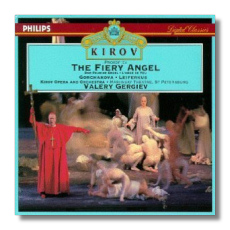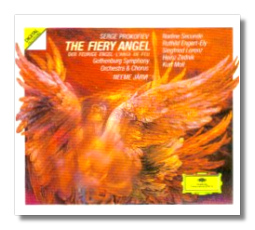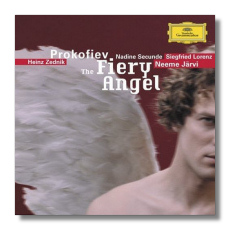
The Internet's Premier Classical Music Source
Related Links
- Prokofieff Reviews
- Latest Reviews
- More Reviews
-
By Composer
-
Collections
DVD & Blu-ray
Books
Concert Reviews
Articles/Interviews
Software
Audio
Search Amazon
Recommended Links
Site News
 CD Review
CD Review
Serge Prokofieff

The Fiery Angel, Op. 37
- Galina Gorchakova, soprano (Renata)
- Sergei Leiferkus, baritone (Ruprecht)
- Evgenia Perlasova-Verkovich, mezzo-soprano (Landlady)
- Olga Markova-Mikhailenko, mezzo-soprano (Mother Superior)
- Konstantin Pluzhnikov, tenor (Méphistophélès)
- Sergei Alexashkin, bass (Faust)
- Vladimir Ognovenko, bass (Inquisitor)
Kirov Chorus and Orchestra, St. Petersburg/Valery Gergiev
Live performance from September 1993; Sung in Russian
Philips 446078-2 DDD 2CDs 54:56, 64:08


- Nadine Secunde, soprano (Renata)
- Siegfried Lorenz, baritone, (Ruprecht)
- Rosemarie Lang, mezzo-soprano (Landlady)
- Ruthild Engert-Ely, mezzo-soprano (Fortune Teller/Mother Superior)
- Heinz Zednik, tenor (Méphistophélès/Agrippa)
- Petteri Salomaa, bass (Faust)
- Kurt Moll, bass (Inquisitor)
Gösta Ohlin's Vocal Ensemble
Pro Musica Chamber Choir, Gothenburg
Gothenburg Symphony Orchestra/Neeme Järvi
Deutsche Grammophon 431669-2 DDD 2CDs 55:50, 62:33 Sung in Russian
Reissued as 477559-6
Amazon
- UK
- Germany
- Canada
- France
- Japan
- ArkivMusic
- CD Universe
Reviewing the Järvi recording of The Fiery Angel for Gramophone (July, 1991), critic David J. Fanning writes of "…some obvious nods to Stravinsky (such as the motif for Renata's obsession with her Fiery Angel being a speeded up version of the opening of The Firebird)…" Fanning seems to suggest that Prokofieff was showing musical deference to his elder by borrowing the motif from the popular ballet. But Prokofieff paying homage to Stravinsky? Not very likely, since he regarded him as his greatest rival (and Stravinsky, it must be noted, harbored similar feelings about Prokofieff). In his notes to the Järvi recording, musicologist Richard Taruskin describes the music depicting Prokofieff's crazed Renata as "… a patently Stravinskyan ostinato…", apparently referring, as well, to the opening of The Firebird. He appears to suggest (since he elaborated no further on the point) that Prokofieff had lifted this music from Stravinsky and transplanted it into his opera, expecting that nobody would notice. Could Prokofieff, though, actually have been naïve enough to think that no one would put two and two together, that no one would recognize the purloined motif from The Firebird showing up slightly altered in The Fiery Angel, which also, of course, just happened to be about a winged creature of fire? Hardly – Prokofieff neither stole in covertness nor borrowed in tribute, but he nevertheless wanted the listener, as we shall see, to make the connection with The Firebird and Stravinsky. For years musicologists have been struggling to analyze this opera, always misinterpreting this aspect (when they noticed it at all).

They have been more concerned with examining this work's apparent contradictions, trying to reconcile its bizarre humor (skeletons that sing out to gainsay their magician-master; Méphistophélès gobbling a servant boy and making him reappear in a dustbin) with its dead-serious music – there's not even an echo of The Love for Three Oranges in this score. Some say the opera is a defense of Christianity: the fanatical Inquisitor's absolute righteousness and poor Renata's hysteria and irrationality, they argue, are among the traits portrayed to excess as a cathartic means of expelling the bad elements within the church to preserve and defend the good. Others conjecture that the work is a psychological examination of a twisted character: are Renata's Madiel (The Fiery Angel) and the other spirits who appear to her real or a figment of her imagination? Others see it primarily as a dark, satiric comedy, a view I more or less hold, and one that seems tenable once we take a look at the Stravinsky connection.
Renata, wherever she goes, Firebird motif in tow, brings havoc and mayhem to those around her, but somehow garners, through some mystical quality, the loyalty of so many of them, like the oft-rejected Ruprecht and the nuns in the convent she joins in the last act. Ruprecht, in fact, is described by Taruskin as "the all-time Man Who Won't Take No for an Answer." It seems quite obvious that Prokofieff, tongue imbedded in cheek, is suggesting, in so often invoking the Firebird motif and associating it with Renata, a parallel between Stravinsky and Renata: Stravinsky's influence is wreaking damage to the music world, his many disciples blindly, irrationally following him to utter catastrophe – ha! ha! Prokofieff's allegorical lampooning of his rival might have worked, but he failed to get this opera staged during his lifetime. Its premier took place in Venice in 1955, two years after his death (although it was given a concert performance in 1954), when its satiric elements had lost some of their relevance. Stravinsky, after all, had by then turned to the influence of Schoenberg, and Cage and Boulez and many others were on the scene. So, it is quite understandable that this element of the opera had been overlooked.
Both these recordings are especially excellent in conveying the many facets of this fascinating work. Järvi is steadier, more consistent in his pacing, and has better sound. Gergiev, a few dull spots excepted, though, is more dramatic, more powerful and, in the end, the better choice. His Renata, Galina Gorchakova, may have a marginally less attractive voice than her DG counterpart, Nadine Secunde, but more than makes up for it in her bloodcurdling dramatics, especially in the last act. The remainder of the cast in both recordings is quite good, with Kurt Moll, Järvi's Inquisitor, excellent in his grimness. Though Philips' sound is hampered slightly by opera pit acoustics from the live performance, it has plenty of power and is more than adequate. Listeners unfamiliar with The Fiery Angel, or with the Third Symphony, which Prokofieff drew from the opera after he had surrendered hopes of seeing it staged, are cautioned that it is a somewhat less approachable work than usual for him, but highly rewarding, certainly one of the most important operas of the century. There is a high quotient of dissonance and decibels, brought out to dramatic effect, though, in both these recordings.
The first and only other recording of this opera (drawn, in fact, from the 1954 concert performance conducted by Charles Bruck, but with Jane Rhodes replacing Lucien Marée as Renata) has been available in a variety of LP incarnations over the decades and was issued in 1989 on CD on the ADES label (and may still be available). It's also an excellent performance (sung in French, though). But beware of the boomy, screechy, weak mono sound. Better to stick with Gergiev for riveting drama or with Järvi for the sound and almost as compelling a performance.
Copyright © 1999 Robert Cummings


















